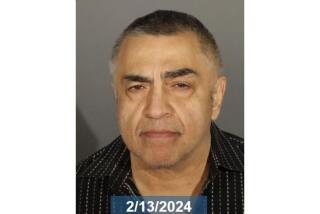Title Fraud Growing Business for Con Artists
- Share via
The property you’ve long owned may not be yours anymore--at least not on paper. You could be one of a growing number of title fraud victims who don’t even know they are victims.
All an enterprising criminal has to do is forge your signature, pretend to be you and get a fake notary seal. If you rent out a house, your tenant can easily call a real estate broker and list your house for sale. Pretending to be you, the tenant can sign over the deed to an innocent buyer and walk away with the money.
Con artists can also pretend to be you and take a loan on your house. Chances are you won’t know this has happened until an eviction notice appears at your door. By then, the con artist has defaulted on the loan and your house has just been sold by a lender you have never met.
The forgers take advantage of the Byzantine process of recording official documents and transferring properties. Usually, the lender makes a loan, an escrow company handles the paperwork and a title company is hired to ensure that all the records are correct.
As outrageous as these title fraud scenarios may seem, they happen regularly in the San Fernando Valley and Ventura County. Forgery has become big business, and there aren’t even many ways to protect yourself.
“The ability to manipulate property and borrow money against it is a playground for knowledgeable criminals,” said Robert A. Weissman, senior partner at the Encino-based law firm Weissman & Weissman. “There are people very well-versed in doing this.”
There are also a lot of amateurs. “The most frequent problem that crosses my desk is the deed of trust forged by a relative or companion without knowledge or authority of the owner,” Weissman said. “Whenever times get tough, you usually see more criminal activity.”
Weissman recently was hired to clean up the title of an Encino home owned by a couple approaching their 80s. Their former daughter-in-law broke into the house with a companion and obtained documents she used to commit a series of forgeries. The perpetrators applied for several loans and credit cards using equity in the house as collateral. One lender, however, realized that something was fishy and stopped payment on its loan. The owners and their son got wind of the fraud and managed to clear the mess up.
Another of Weissman’s cases involved an elderly woman’s nephew who improperly took a second mortgage on her Burbank home. He used an impostor and had the documents notarized in Palm Springs. The lender was the major victim of this fraud, but title insurance covered its losses.
As long as owners can prove that they are indeed the true owners, they won’t lose their property. Usually, lenders and victimized buyers are left with most of the losses.
But proving ownership and hiring a lawyer to do what’s known as quiet title, or officially clearing away any ambiguity about ownership, can take months and cost between $5,000 and $10,000. Title insurance covers only frauds and forgeries predating the insurance policy. Anything that happens after you buy your home is your problem.
“The ownership to your home is exposed constantly,” warned Jim Peters, vice president and chief advisory title officer at Stewart Title Co., Glendale. “Anyone can go in and forge another deed and record it.”
To make matters worse, “unfortunately, practically none of this stuff is ever prosecuted,” Peters said.
Catching the crooks is one problem. Another is that law enforcement authorities can rarely pin down where the fraud and forgeries actually took place--creating a jurisdictional problem.
The most frequent objects of title forgeries include deeds of trust, deeds of reconveyance and quitclaim deeds and substitution of trustee forms, Peters said.
These forgeries place title in the name of the forger, clear away encumbrances or name a new trustee who is somehow involved in the scam.
With forged documents, a con artist can sell a property, refinance it or rent itout.
“One problem is lenders who aren’t diligent and especially loan brokers who don’t have their own money at risk,” said Edward R. Beierle, senior vice president and general counsel at Continental Lawyers Title Insurance Corp. in Universal City.
Continental Lawyers’ parent company incurred $5 million in losses last year as a result of fraud and forgery in California. To help stem the losses, employees get a $500 reward for detecting frauds. One employee has racked up $20,000 in these bonuses.
“The prosecutions are minuscule compared to the amount of real estate fraud that exists,” said Albert MacKenzie, a Los Angeles County deputy district attorney in the major fraud division. “It’s very easy to do. It may take several months before anyone realizes there’s a fraud.”
It’s impossible to ensure that you won’t become a victim, MacKenzie said, but it helps to be suspicious whenever people start asking you questions about your property ownership. When it comes to buying or selling a property, he added, be sure to deal with a reputable escrow company. Some front companies have been known to walk away with escrow funds or deeds of trust.
When it comes to signing a real estate-related document, he said, “never be rushed, read every piece of paper.” And when buying a home or making a loan, do a thorough title search and obtain title insurance. That will at least help to ensure that you’re insured for frauds predating the purchase or loan.
Owners who have reason to believe that they’re the victims of a scam should consult an attorney and have their title quieted. If you’re looking to invest in a deed of trust or property loan, make sure that the borrower really owns the property being used as security. Check to see who occupies the property and make sure that all signatures match.
More to Read
Inside the business of entertainment
The Wide Shot brings you news, analysis and insights on everything from streaming wars to production — and what it all means for the future.
You may occasionally receive promotional content from the Los Angeles Times.










